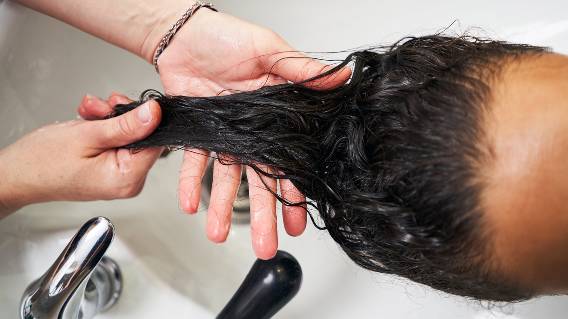FDA Postpones Deadline To Remove Formaldehyde From Hair Relaxers
Editors carefully fact-check all Consumer Notice, LLC content for accuracy and quality.
Consumer Notice, LLC has a stringent fact-checking process. It starts with our strict sourcing guidelines.
We only gather information from credible sources. This includes peer-reviewed medical journals, reputable media outlets, government reports, court records and interviews with qualified experts.

The Food and Drug Administration (FDA) has yet again postponed its ban on formaldehyde and formaldehyde-releasing chemicals in hair straightening products, igniting fresh frustration for advocates.
These are chemicals commonly used in hair straightening products and relaxers that are primarily marketed to Black women. Studies have linked them to increased health risks, including cancer.
A recent entry posted on the Unified Agenda, a government website outlining federal regulations and public input opportunities, noted the implementation date was moved to September. Initially, the FDA had slated the ban for April. The dates listed on the site are estimates, not firm deadlines.
An FDA spokesperson, cited by Medical Brief, said “The rule-making process takes time.”
The agency’s decision to delay the long-awaited regulations has sparked renewed frustration among advocates and consumer groups who have been urging the FDA to take swift action on the public health issue.
“We look forward to reading a new rule that will protect salon workers and consumers from exposure to formaldehyde in hair-straightening products,” Melanie Benesh, the vice president of government affairs for the Environmental Working Group, told NBC News.
Formaldehyde: A Known Carcinogen
Researchers have linked formaldehyde, the same chemical used to embalm dead bodies, to a range of health problems, including cancer, respiratory issues and skin irritation.
Studies have consistently shown that exposure to this chemical, often present in hair relaxers and other styling products, poses significant risks to both consumers and salon workers. Despite overwhelming evidence of these dangers, the FDA has struggled to finalize regulations to protect the public.
A 2022 study by the National Institutes of Health found women who used chemical hair straighteners over four times a year had double the risk of developing uterine cancer.
As of July 2024, there were nearly 8,200 hair straightener lawsuits pending in multidistrict litigation in the U.S. District Court of the Northern District of Illinois. It’s still in its early stages and lawyers expect more people to file hair straightener lawsuits. The number of lawsuits swelled after the NIH published their 2022 study. Defendants named in the hair straightener lawsuits include L’Oreal, Soft Sheen Carson, Strength of Nature and others.
Benesh told NBC News in a statement that the FDA “has long been aware of the health hazards posed by formaldehyde.”
Risks of Formaldehyde in Hair Relaxers
While not all chemical hair relaxers contain formaldehyde, many include chemicals that, once heated, can release formaldehyde.
The colorless, strong-smelling, flammable chemical has an industrial use in pressure-treated wood such as particleboards and plywood. Consumers also use formaldehyde as a fungicide, germicide and disinfectant, as well as a preservative in mortuaries and medical labs, according to the National Cancer Institute.
“Most hair smoothing or straightening products release formaldehyde gas into the air during the hair straightening or smoothing process,” according to the FDA’s page on hair dye and hair relaxers.
“Formaldehyde gas is a known human carcinogen as classified by the International Agency for Research on Cancer and formaldehyde exposure can cause both short- and long-term health effects.”
The agency urges those who want to straighten their hair to go to a professional salon to have the technique performed. The Occupational Safety and Health Administration, OSHA, issued a ‘hazard alert’ to hair salon owners and workers about potential exposure to formaldehyde from hair smoothing products.
Some companies have responded by changing the chemical formulas or listing the chemical on its packaging. The FDA says retail products sold directly to consumers that contain formaldehyde-related ingredients, like formaldehyde, formalin or methylene glycol, are required to list these on the label.
Editor Lindsay Donaldson contributed to this article.